American Disdain Concocted by Distorted Translation: Comparing Taiwan, Mainland and American Fragments of the Same Book
Sometimes we are under the filter of power without knowing it.
Writing this article was purely accidental. I recently saw the reading notes of a book on Matters, first I saw the Taiwan version on Google Play, and then I found the simplified version on Duokan Reading. After downloading the simplified version for free trial reading, I read a few paragraphs and suddenly found that the style of writing was very abrupt. Surprised, I opened the Taiwanese translation, and after reading a few paragraphs, I found that it was almost completely different from the simplified version. Like swallowing a red pill (The Matrix), I suddenly realized that maybe there was something worse in between.
I would like to introduce a little background first: experts, some of which are "public intellectuals" (public knowledge), are already street rats in China, and everyone shouts and beats them. The author of this book hopes to bridge the relationship between experts and citizens - a meaning that is fully reflected in the Taiwan version, but barely reflected in the mainland version due to various treatments. At the same time, both the English and Taiwan editions of this book maintained the theme of "There is a problem with the democratic system, let's fix it together", while in the mainland version, the theme became: "Democratic system is not good, the United States is about to die, about to collapse."
Of course, anyone (including me) may have the problem of over-interpreting. If the analysis is not appropriate from a political point of view, you have the right to think that I am criticizing the inadequacy of the mainland version. If you don't want to read the arguments, you can skip directly to the end of the article to see the conclusion. In order to facilitate the reading of readers who are not proficient in English, I use Google Translate to translate some of them into English.
Let's start with the title and cover:

Judging from the title, the subject word of the English title is Expertise. If translated by any dictionary, this is "professional", not "expert". The original intention of English books is to criticize the society's contempt for professional knowledge and professionalism, not just for the "expert" group, so the translation of the Taiwan version is closer to the original meaning of English, but the translation of the mainland version is more eye-catching, and it may be used in commercial marketing. There are more sales - and it fits the psychological situation that domestic people hate "public knowledge". Of course, the Taiwan version added " the collapse of the relationship between experts and citizens, which is equivalent to the gaffe of the democratic system " under the book. This book was originally a reflection on the democratic system and the status quo in the United States. Adding such a general sentence very well condenses the essence of the book - but it is obviously impossible to appear in the mainland version.
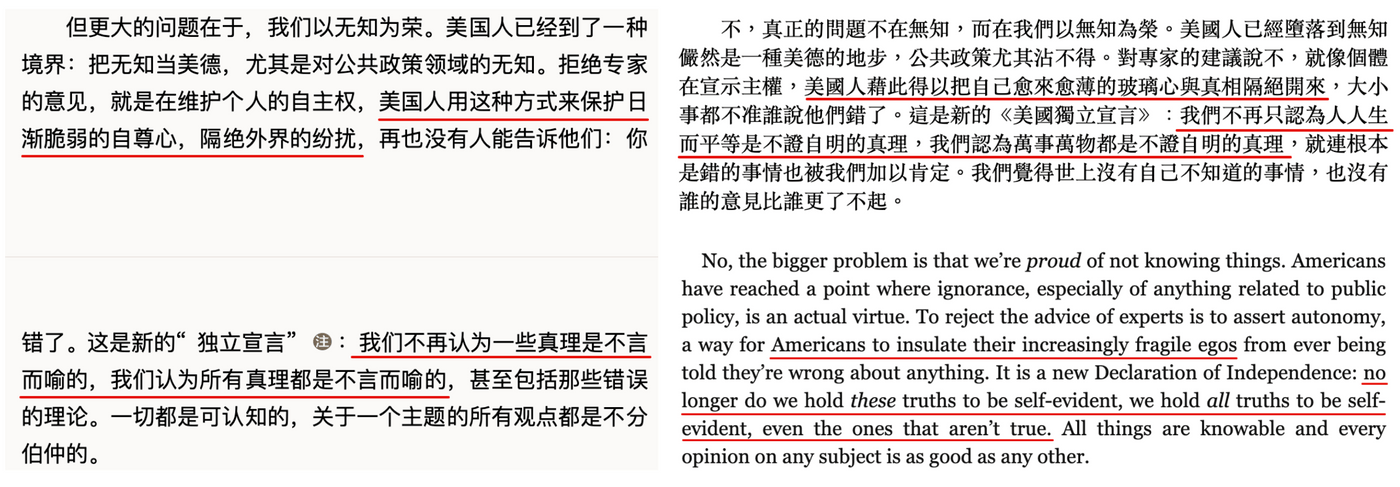
Let's take a look at the original text first: Americans to insulate their increasingly fagile egos. The mainland version says that " Americans use this method to protect their increasingly fragile self-esteem " - here, "self" (egos) is translated as " self-esteem ", which is actually possible, and it is not wrong, but "self-esteem" is in the domestic language. There are many extensions in the environment - such as "national self-esteem", "national self-esteem", "self-esteem and self-love", etc. The mention of "the increasingly fragile self-esteem of Americans" is easy to make readers inadvertently associate, ah, why Americans Is your self-esteem weakening? Is it because the United States is becoming more and more declining and China is becoming more and more powerful? The translation of the Taiwanese version is " Americans are able to isolate their thinning glass hearts from the truth ". " Glass Heart " may be a more Taiwanese localized translation, but in my opinion, getting rid of the national context and pointing out is a more personal psychology and a better translation.
Then why protect the self-esteem or the glass heart? The mainland's translation says " isolation from outside disturbances ", what disturbances? Without mentioning it, let the reader guess—perhaps the fall of the American empire and its demise on the international stage. The Taiwanese version translates it very simply: " isolate yourself from the truth ". The Taiwanese version here really follows the English translation, because the English is: from ever being told they're wrong about anything (which can be paraphrased as "truth"). Why is the mainland translation unwilling to add the word "truth"? very interesting.
The next paragraph is really wonderful. Continental is a very simple literal translation from English "No longer do we hold these truths to be self-evident, we hold all truths to be self-evident", but use the wrong idiom, English is "self-evident", and "evidence" "is what "proof/evidence" means, so "self-evident" is a better translation than "self-evident". So the mainland version of the translation becomes very tongue-in-cheek: " We no longer think some truths are self-evident, we think all truths are self-evident. " - what does this mean! ? What does this have to do with the Declaration of Independence? The Taiwanese version is very considerate to supplement the translation of the Declaration of Independence: " We no longer only think that all men are created equal is a self-evident truth, we believe that everything is a self-evident truth ." Maybe "all men are created equal" is a sensitive word, so the translator did not dare to write the "truth", but the result is confusion in the understanding of the readers.
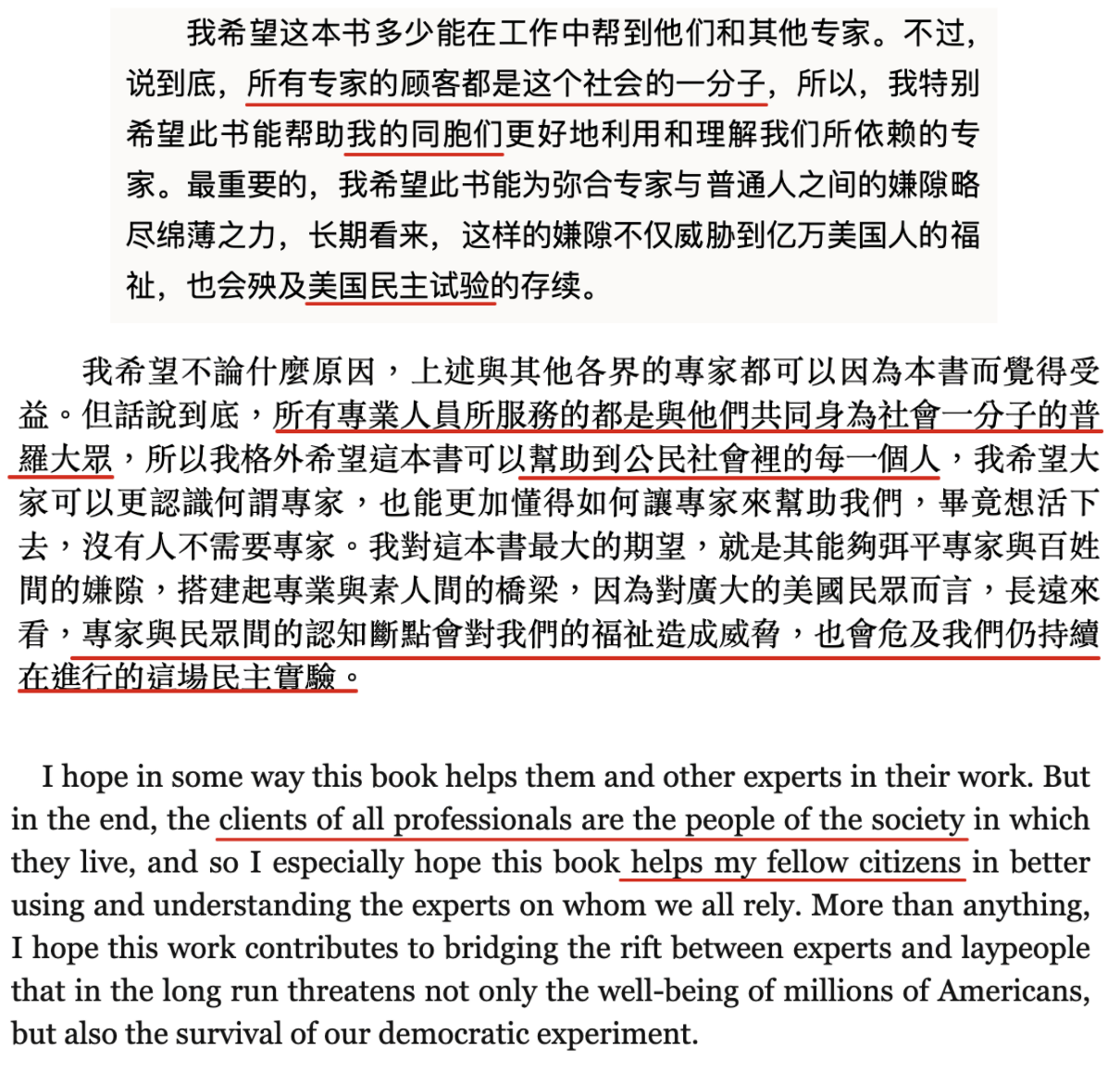
The desktop version, though longer, is smoother and easier to read. Regardless of basic elements such as legibility, the attitudes conveyed by the two passages are very different. There is a difference between "all specialists' clients are part of this society" and "all professionals serve the general public with whom they are a part of society". Although the mainland version seems to be a faithful "literal translation" of English, the original English version by no means emphasizes the "commercial" relationship between experts and the public, because business relationships are unfamiliar and indifferent, and there is no real emotion between waiters and customers . The Taiwanese version is free to translate the original English: the emphasis is on the " service " relationship between experts and the public. The mainland version pits experts against the public, while the Taiwan version reconnects experts with the public—it's not hard to see which is the original intention of the author as an expert.
Of course, the other two parts are more fun. First of all, the English original " my fellow citizens ", obviously "citizens" corresponds to "citizens", and the mainland version is translated as " compatriots ". Not only is this translation wrong - not just that the word "citizen" is not translated, but " my compatriots " - and regardless of the "nationalist" tendencies of the word, this passage is where the author elevates the main idea of the whole book. , but sublimation disappears because it translates abbreviated to " I hope this book will help my fellow citizens. " The Taiwanese translation is " I hope this book can help everyone in civil society ". This is not only the original meaning of English, but also sublimates the theme of this book - this is not a book for experts, this is a book for all members of society. This can also be blamed on inaccurate translations.
I emphasized earlier that the mainland version pits experts against the public—it’s also obvious here that the mainland version directly writes: “Help my compatriots to better utilize and understand the experts we rely on”—of course, this is true again A literal translation of English, but completely ignoring the author's own intent. "The Taiwan version unifies the experts and the public: "I hope everyone can know more about what an expert is, and how to get an expert to help us ." "
Finally in English: the survival of our democratic experiment . The mainland version thoughtfully added the word "United States", so it was translated as " injurious to the survival of the American democratic experiment ", while the Taiwan version translated as "will also endanger the democratic experiment that we are still going on ." In fact, I have to admire the fact that the translator from the mainland is seeking truth from facts. Democracy is not China's business after all. Taiwanese can claim that democracy is " our " experiment, but Chinese people must never say that, and Chinese readers will not accept it.
If the previous translation is still the occasional omission of translation, intentional literal translation, and inadvertent supplementary translation - these can all be attributed to professional errors such as insufficient translation level, insufficient proofreading, etc., the following translation is already malicious full of:
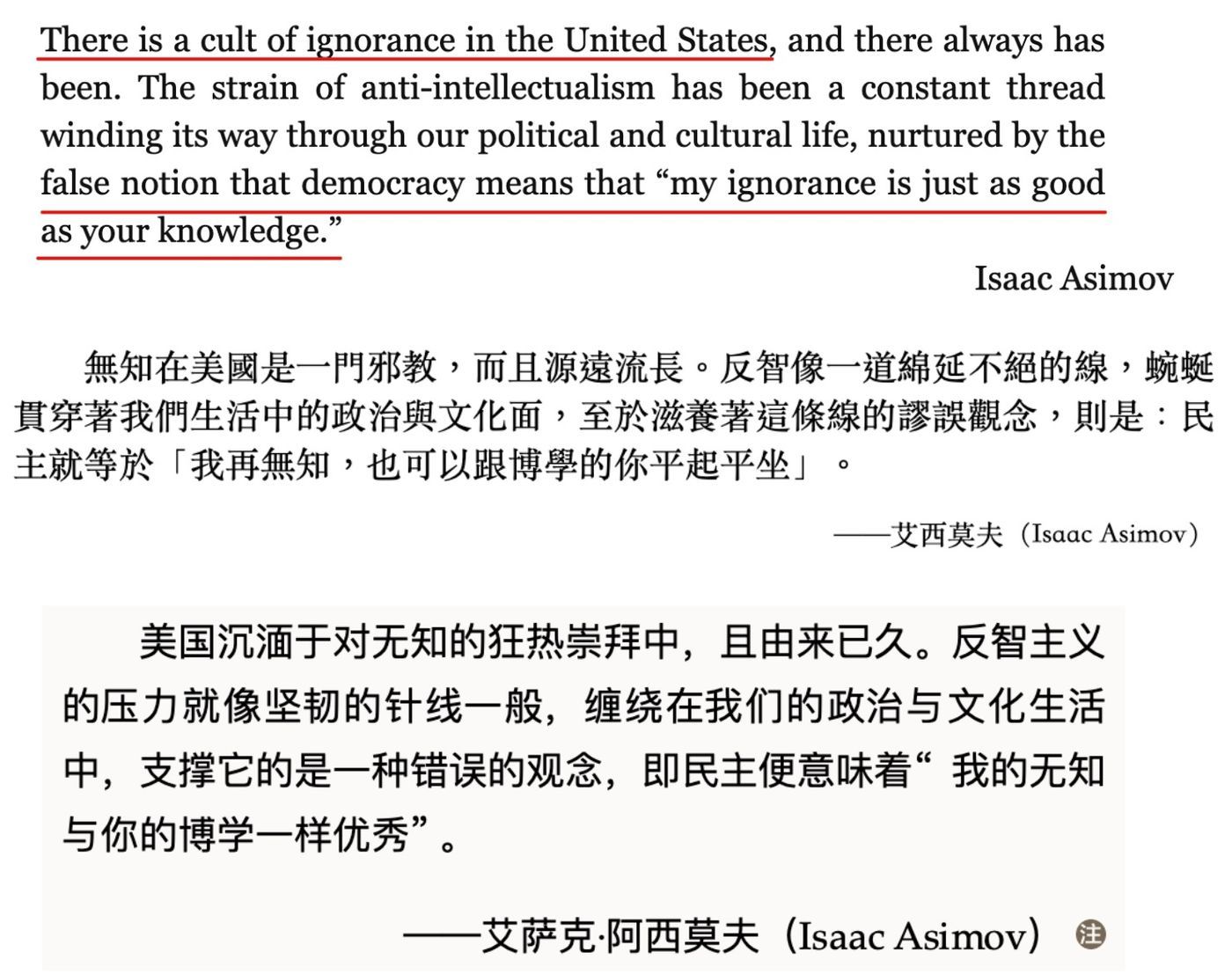
Earlier I pointed out that many mainland translations are "literal translations", so although they do not translate to the realm of the original text, they are still a manifestation of "faithfulness to the original text". Although there are occasional mistakes, there is really no need to criticize them. Here things have risen to a more serious level. Linguistics has a phenomenon called "generalization", which is the so-called "map gun". Asimov's original text is: There is a cult of ignorance in the United States. The Taiwanese version literally translates as " Ignorance is a cult in America ". Here, the mainland translation turns out to be " America indulges in the cult of ignorance "—a generalization, like "Northeasterners are rude." This is a very important distinction: cults are not for everyone, only some. Both the Taiwanese version and the original English version clearly reject generalization to the American group. The mainland version is very straightforward and generalizes to the American group—the United States is ignorance, the United States worships ignorance, and is still very fanatical, you see, this is you The ideal "America" in my mind.
Next, the mainland version says " democracy means that my ignorance is as good as your erudition " - the emphasis is on " my ignorance is as good as your erudition ", although this is a literal translation, but after each word is translated independently, The position of the entire sentence is neutral! This obviously gives the reader a wrong perception. Although there is a weak rebuttal at the beginning of the sentence ("It is supported by a wrong concept"), it is obviously not as good as the translation of the Taiwan version: "Democracy is equal to [ no matter how ignorant I am, I can be on an equal footing with the learned you ]." Here With the word " re ", the position of this sentence has been turned into an ironic opposite position - it is very direct to let readers understand that this is not the concept of democracy.
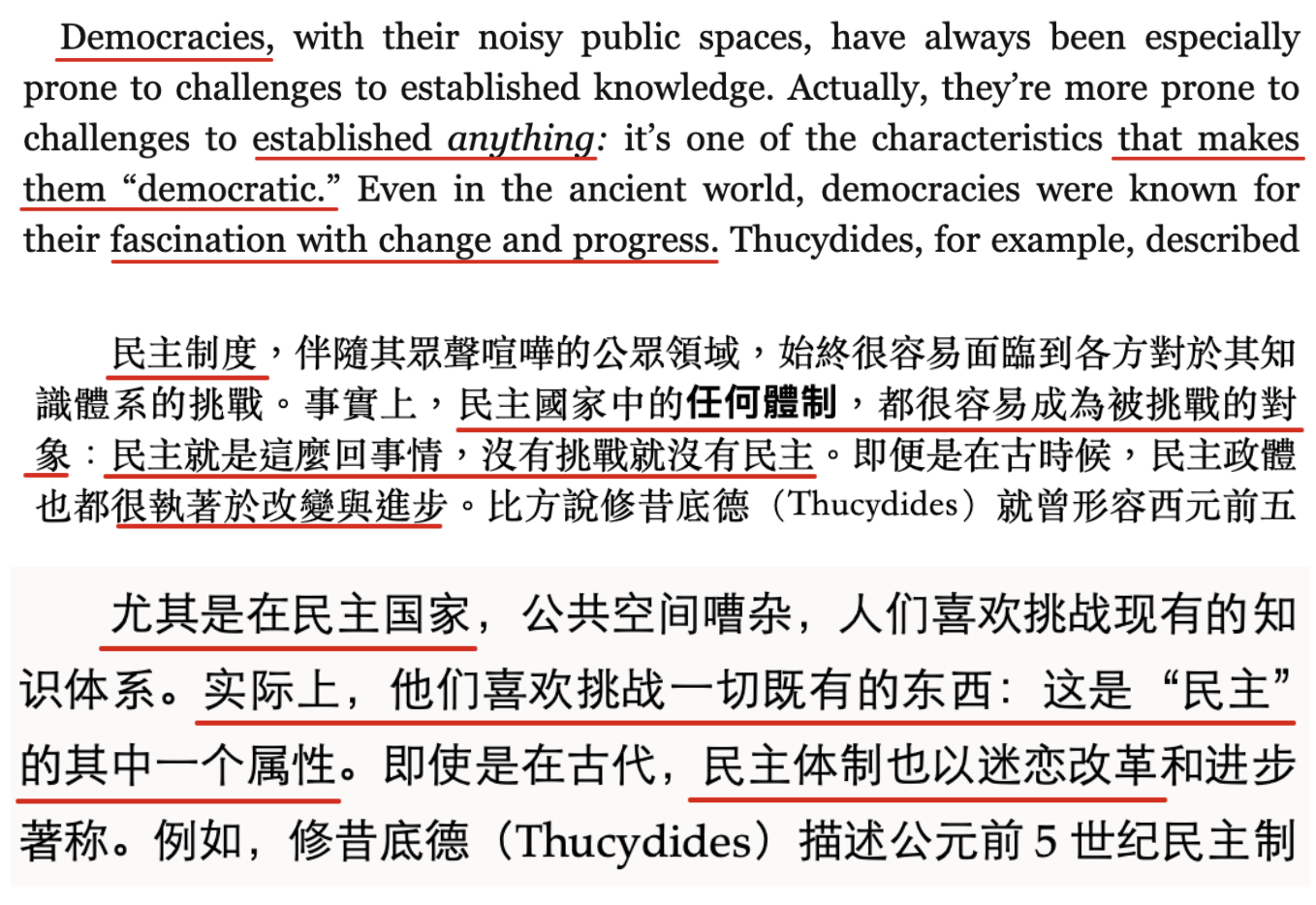
The mainland version translates "Democracies" into "democratic country". This passage is "in a democratic country, the public space is noisy, and people like to challenge the existing knowledge system." This implies that the public space of a democratic country is very noisy, implying that the democratic system will cause Public spaces are noisy . The real English original text is " Democracies, with their noisy public spaces " - the best translation of "with" is " accompany ", which means that this kind of noise in the public sphere is not the product of the democratic system, the Taiwan version translates as " democratic system, With its noisy public sphere ", it not only clears the relationship between democracy and the public sphere, but also translates "Noise" as "buzzing" (a positive word) rather than "noisy" (a negative word). ). Loudness is a good thing, noise is a bad thing. It is not difficult to see the positions of the translators on both sides.
And then, in English, " established anything " (established anything), "establishment" means establishment or " system ", so the Taiwanese translation is very accurate: any system in a democratic country can easily become object of challenge . The mainland version simply translates to: They like to challenge everything that exists . All of a sudden, the image of the mob who likes to "challenge everything" pops up on paper.
Next, the Taiwan version clearly clarifies the relationship between democracy and challenge: "There is no democracy without challenge", although this is a free translation, but the meaning of the original English text: challenge is one of the attributes that makes democracy possible (It's one of the charactersitics that makes them democractic ). The mainland version translates to: " Challenge is one of the attributes of democracy ". Weakening the importance of the challenge to the system to democracy.
Then there is the translation of "fascination", which can be translated into positive colors ("love" or "attachment") and slightly negative colors ("fascination", "obsessed"), the Taiwan version uses positive Color: Democracy is obsessed with reform and progress. The mainland version uses negative colors: the democratic system is obsessed with reform and progress.
Of course, the comparison is here, and the part that can be read for free is over. Finally let's take a look at their directory:
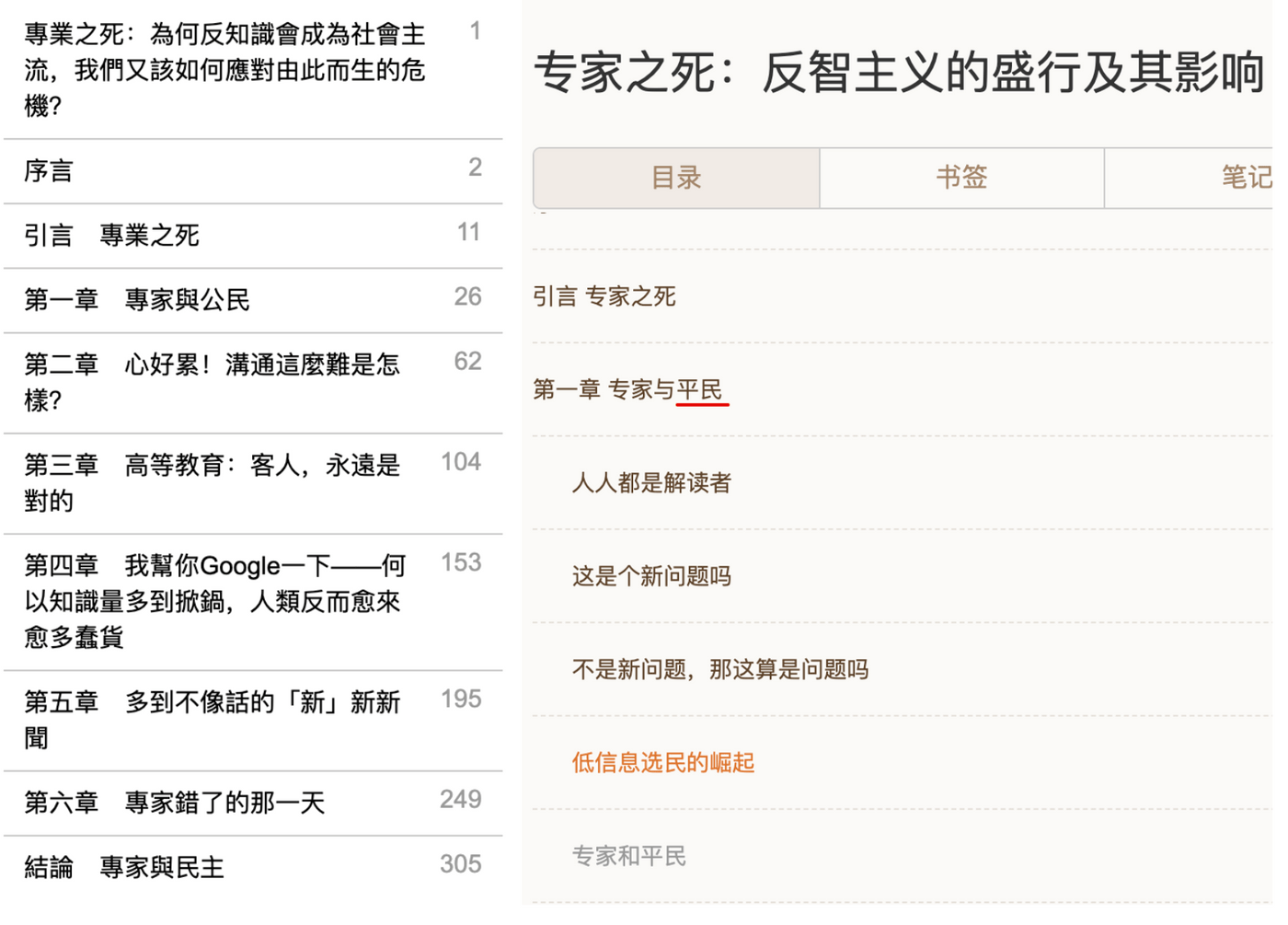
Naturally, the word "citizen" cannot be used arbitrarily.
I think this book is of great significance. Whether it is for China or the United States, the discussion in the online (public) space is increasingly noisy, which is obviously not a problem unique to democracies. In China, the complete decline of the public knowledge naturally has the shadow of public power, but in the United States, the public's distrust of the public knowledge is also increasing day by day (the public knowledge does not "decline" at all in the United States, they write books, newspaper publications, and give interviews on TV. Today Join a think tank company, and enter a university tomorrow to teach, you can earn a lot of money every day). In the Taiwan edition, the translation of the book is based on "how should we deal with this crisis"—the argument for repairing democracy. Of course, the argument of the mainland version is that anti-intellectualism prevails in a democratic society, and it will have a very bad impact - but the problem pointed out by the article is even worse in the mainland.
If a young Chinese man who has never left China can't read the original text in English and can't access Taiwanese publications, what kind of Western and American society he knows? In such a low-quality translation, there may even be malicious omissions, and he chooses words with negative emotions. The United States he knows is one: people are willing to challenge everything (rebels), obsessed with constant reform, indulge in ignorant fanaticism, Self-esteem is weakening and democracy is dying.
And one of the same, what young people in Taiwan have learned about America and democracy is: equality is a self-evident truth, professionals need to serve society, and we need to bridge the breakpoints between experts and the public to save our democratic experiment ( system), there is no democracy without challenges, and democracy is obsessed with change and progress.
It is easy to see that one creates a negative image and one creates a positive image. Seeing the micro-knowledge, if the translation of this book I occasionally see has such problems, it is hard to imagine how other vast Western books that have been translated into the Chinese market will be treated. These translations, at best, are of poor quality and level, at worst, they make people despise Western society even more, thus giving rise to the idea of "we are not bad". Perhaps this can also be seen why China's online environment in recent years has changed from admiring the West in the past to despising and despising the West now. Subtle influences like this cannot be ignored.
The desktop version can be purchased on Google Play: link
Like my work? Don't forget to support and clap, let me know that you are with me on the road of creation. Keep this enthusiasm together!





- Author
- More